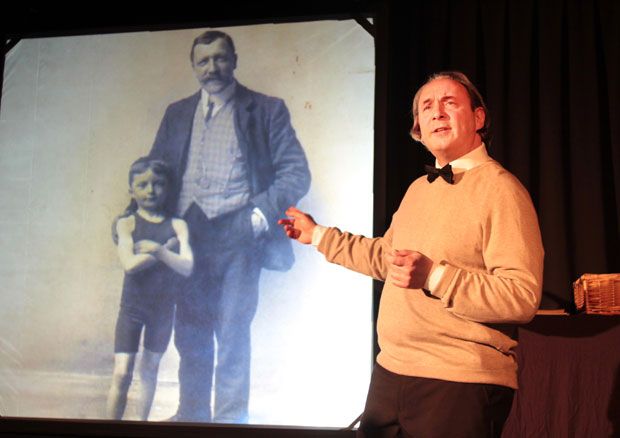Jabez Wolffe was an Edwardian cross-Channel swimmer, an unsuccessful, but remarkably persistent one, whose obituary made the pages of the New York Times. He sounds quite the eccentric, well worthy of a jovial, biographical stage show praising his pluck in the face of cruel fate. He certainly gets affectionate handling here in this solo storytelling piece. Then again, he would – writer and performer Giles Croft is a distant relative. This is a labour of familial love.
There’s no questioning the choice of subject matter. Heroic failure can make great entertainment, and if the show restricted itself to jocular anecdotes about Wolffe’s doomed exploits (of which there are plenty, even if they appear stitched together from scant media reports) then all would be well.
Croft (also outgoing artistic director of Nottingham Playhouse) doesn’t keep the family connection purely incidental though. Nor does he go the whole hog and draw explicit parallels between Jabez and his own life – the “chip off the old block” approach, which would also be a nice treatment of the topic. Instead, he leaves us in a halfway house where Jabez isn’t left alone to be the star of his own show, yet doesn’t fully function as an influence on Croft himself.
The family album doesn’t end with Jabez either. A clipping of an aristocratic lady is flashed up for no better reason than she’s another cousin of Wolffe and Croft. A copy of Tarka the Otter (a thematic link, if an oblique one) is brought out to help Croft illustrate his father’s sense of humour. The instinct to share family stories is understandable, but they are left to stand alone, apparently self-justified. Croft offers no means by which an audience can connect to them.
At another juncture, apropos of nothing, Croft shares his love of guitarist Peter Green, then, mocking his own lack of effort at learning the guitar, has a rudimentary strum of one of Jabez’ favourite tunes. This could be seen as Croft comparing his thwarted ambitions with those of Wolffe, but you’d have to strain for that interpretation. In the moment, it comes across as just an excuse for Croft to play his expensive guitar on stage.
No doubt Wolffe – also notable for his ahead-of-the-times support of female endurance swimmers – would be glad his efforts were not entirely in vain, and could still hold an audience a century later. One hopes he’d also see the funny side of his failures, as this audience does today. Croft does right to reintroduce him to the world, but he could have done so more generously.
